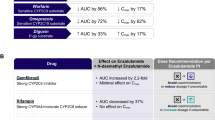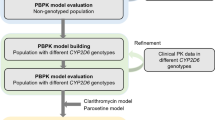Summary
The effects of polymorphisms in CYP3A4 (20230G > A), CYP3A5 (6986A > G), ABCB1 (1236C > T, 2677G > T/A, 3435C > T), ABCG2 (421C > A), and ABCC2 (-24C > T) on the area under the concentration–time curve (AUC) of osimertinib in 23 patients with non-small cell lung cancer were investigated. Blood sampling was performed just prior to and at 1, 2, 4, 6, 8, 12, and 24 h after osimertinib administration at the steady-state on day 15 after beginning therapy. The osimertinib AUC0-24 was significantly correlated with age (P = 0.038), serum albumin (P = 0.002), and serum creatinine (P = 0.012). Additionally, there were significant differences in the AUC0-24 of osimertinib among the groups administered vonoprazan, histamine 2-receptor antagonists or esomeprazole, and no acid suppressants (P = 0.021). By contrast, there were no significant differences in the AUC0-24 of osimertinib between genotypes of CYP3A4/5 or ABC transporters. Furthermore, there were no significant differences in the AUC0-24 of osimertinib between patients with diarrhea, skin rash, or hepatotoxicity and those without these conditions. In multivariate analysis, only serum albumin value was an independent factor predicting the AUC0-24 of osimertinib. Analysis of CYP3A4/5 and ABC transporter polymorphisms before osimertinib therapy may not predict the efficacy or side effects of osimertinib. The lower serum albumin values were associated with an increase in the AUC0-24 of osimertinib; however, further studies are needed to assess the factors contributing to the interindividual variability of osimertinib pharmacokinetics.

Similar content being viewed by others
Data availability
All data generated or analyzed during this study are included in this published article and its supplementary information files.
Abbreviations
- ABC:
-
ATP-binding cassette
- AUC:
-
Area under the plasma concentration–time curve
- BCRP:
-
Breast cancer resistance protein
- Cmax :
-
Maximal plasma concentration
- C0 :
-
Trough plasma concentration
- CYP:
-
Cytochrome P450
- EGFR:
-
Epidermal growth factor receptor
- HPLC:
-
High-performance liquid chromatography
- NSCLC:
-
Non-small cell lung cancer
- TKI:
-
Tyrosine kinase inhibitor
References
Ramalingam SS, Vansteenkiste J, Planchard D et al (2020) Overall survival with osimertinib in untreated, EGFR-mutated advanced NSCLC. N Engl J Med 382:41–50. https://doi.org/10.1056/NEJMoa1913662
Mok TS, Wu YL, Ahn MJ et al (2017) Osimertinib or platinum-pemetrexed in EGFR T790M-positive lung cancer. N Engl J Med 376:629–640. https://doi.org/10.1056/NEJMoa1612674
Brown K, Comisar C, Witjes H et al (2017) Population pharmacokinetics and exposure-response of osimertinib in patients with non-small cell lung cancer. Br J Clin Pharmacol 83:1216–1226. https://doi.org/10.1111/bcp.13223
Dickinson PA, Cantarini MV, Collier J et al (2016) Metabolic disposition of osimertinib in rats, dogs, and humans: insights into a drug designed to bind covalently to a cysteine residue of epidermal growth factor receptor. Drug Metab Dispos 44:1201–1212. https://doi.org/10.1124/dmd.115.069203
MacLeod AK, Lin D, Huang JT, McLaughlin LA, Henderson CJ, Wolf CR (2018) Identification of novel pathways of osimertinib disposition and potential implications for the outcome of lung cancer therapy. Clin Cancer Res 24:2138–2147. https://doi.org/10.1158/1078-0432.CCR-17-3555
Ballard P, Yates JW, Yang Z et al (2016) Preclinical comparison of osimertinib with other EGFR-TKIs in EGFR-mutant NSCLC brain metastases models, and early evidence of clinical brain metastases activity. Clin Cancer Res 22:5130–5140. https://doi.org/10.1158/1078-0432.CCR-16-0399
Pilla Reddy V, Walker M, Sharma P, Ballard P, Vishwanathan K (2018) Development, verification, and prediction of osimertinib drug-drug interactions using PBPK modeling approach to inform drug label. CPT Pharmacometrics Syst Pharmacol 7:321–330. https://doi.org/10.1002/psp4.12289
Gao N, Zhang X, Hu X et al (2022) The influence of CYP3A4 genetic polymorphism and proton pump inhibitors on osimertinib metabolism. Front Pharmacol 13:794931. https://doi.org/10.3389/fphar.2022.794931
Fukushima-Uesaka H, Saito Y, Watanabe H et al (2004) Haplotypes of CYP3A4 and their close linkage with CYP3A5 haplotypes in a Japanese population. Hum Mutat 23:100–108. https://doi.org/10.1002/humu.9210
Miura M, Satoh S, Kagaya H et al (2011) Impact of the CYP3A4*1G polymorphism and its combination with CYP3A5 genotypes on tacrolimus pharmacokinetics in renal transplant patients. Pharmacogenomics 12:977–984. https://doi.org/10.2217/pgs.11.33
Kobayashi H, Sato K, Niioka T, Miura H, Ito H, Miura M (2015) Relationship among gefitinib exposure, polymorphisms of its metabolizing enzymes and transporters, and side effects in Japanese patients with non-small-cell lung cancer. Clin Lung Cancer 16:274–281. https://doi.org/10.1016/j.cllc.2014.12.004
Akiyama Y, Fujita K, Ishida H et al (2012) Association of ABCC2 genotype with efficacy of first-line FOLFIRI in Japanese patients with advanced colorectal cancer. Drug Metab Pharmacokinet 27:325–335. https://doi.org/10.2133/dmpk.dmpk-11-rg-128
Takahashi N, Miura M, Scott SA et al (2010) Influence of CYP3A5 and drug transporter polymorphisms on imatinib trough concentration and clinical response among patients with chronic phase chronic myeloid leukemia. J Hum Genet 55:731–737. https://doi.org/10.1038/jhg.2010.98
Planchard D, Brown KH, Kim DW et al (2016) Osimertinib Western and Asian clinical pharmacokinetics in patients and healthy volunteers: implications for formulation, dose, and dosing frequency in pivotal clinical studies. Cancer Chemother Pharmacol 77:767–776. https://doi.org/10.1007/s00280-016-2992-z
Miura M, Sato K, Miura H et al (2014) A limited sampling strategy for estimation of the area under the plasma concentration-time curve of gefitinib. Ther Drug Monit 36:24–29. https://doi.org/10.1097/FTD.0b013e31829dabbc
Tamura T, Takagi Y, Okubo H et al (2017) Plasma concentration of osimertinib in a non-small cell lung cancer patient with chronic renal failure undergoing hemodialysis. Lung Cancer 112:225–226. https://doi.org/10.1016/j.lungcan.2017.07.007
Wu L, Xu X, Shen J et al (2007) MDR1 gene polymorphisms and risk of recurrence in patients with hepatocellular carcinoma after liver transplantation. J Surg Oncol 96:62–68. https://doi.org/10.1002/jso.20774
Tanaka H, Imamura N, Oguma N et al (2001) Acute myelogenous leukemia with PIG-A gene mutation evolved from aplastic anemia-paroxysmal nocturnal hemoglobinuria syndrome. Int J Hematol 73:206–212. https://doi.org/10.1007/BF02981939
Cascorbi I, Gerloff T, Johne A et al (2001) Frequency of single nucleotide polymorphisms in the P-glycoprotein drug transporter MDR1 gene in white subjects. Clin Pharmacol Ther 69:169–174. https://doi.org/10.1067/mcp.2001.114164
Kobayashi D, Ieiri I, Hirota T et al (2005) Functional assessment of ABCG2 (BCRP) gene polymorphisms to protein expression in human placenta. Drug Metab Dispos 33:94–101. https://doi.org/10.1124/dmd.104.001628
Naesens M, Kuypers DR, Verbeke K, Vanrenterghem Y (2006) Multidrug resistance protein 2 genetic polymorphisms influence mycophenolic acid exposure in renal allograft recipients. Transplantation 82:1074–1084. https://doi.org/10.1097/01.tp.0000235533.29300.e7
Vishwanathan K, Dickinson PA, So K, Thomas K et al (2018) The effect of itraconazole and rifampicin on the pharmacokinetics of osimertinib. Br J Clin Pharmacol 84:1156–1169. https://doi.org/10.1111/bcp.13534
TAGRISSO® (Osimertinib) (2022) Drug interview form (package insert). AstraZeneca K.K., Osaka, Japan. Available from: https://med.astrazeneca.co.jp/product/TAG.html#
Yokota H, Sato K, Sakamoto S et al (2021) Relationship between plasma concentrations of afatinib and the onset of diarrhea in patients with non-small cell lung cancer. Biology (Basel) 10:1054. https://doi.org/10.3390/biology10101054
Huang J, Meng L, Yang B, Sun S, Luo Z, Chen H (2020) Safety profile of epidermal growth factor receptor tyrosine kinase inhibitors: a disproportionality analysis of FDA Adverse Event Reporting System. Sci Rep 10:4803. https://doi.org/10.1038/s41598-020-61571-5
Yasumuro O, Uchida S, Kashiwagura Y et al (2018) Changes in gefitinib, erlotinib and osimertinib pharmacokinetics under various gastric pH levels following oral administration of omeprazole and vonoprazan in rats. Xenobiotica 48:1106–1112. https://doi.org/10.1080/00498254.2017.1396379
Vishwanathan K, Dickinson PA, Bui K, Cassier PA et al (2018) The effect of food or omeprazole on the pharmacokinetics of osimertinib in patients with non-small-cell lung cancer and in healthy volunteers. J Clin Pharmacol 58:474–484. https://doi.org/10.1002/jcph.1035
TAKECAB® (Vonoprazan) (2022) Drug interview form (package insert). Takeda Pharmaceutical Company Limited., Tokyo, Japan. Available from: https://www.takedamed.com/mcm/medicine/download.jsp?id=162&type=INTERVIEW_FORM
Funding
This research was funded by grants (nos. 20K07150 and 22H04281) from the Japan Society for the Promotion of Science, Tokyo, Japan.
Author information
Authors and Affiliations
Contributions
Hayato Yokota, Kazuhiro Sato, Katsutoshi Nakayama, and Masatomo Miura participated in the design of the study and reviewed the results. Kazuhiro Sato, Sho Sakamoto, Yuji Okuda, Mariko Asano, Masahide Takeda, and Katsutoshi Nakayama were responsible for patient enrollment and were involved in data acquisition. Hayato Yokota carried out genotyping. Hayato Yokota and Natsuki Fukuda investigated the incidence of osimertinib-induced side effects and medication status. Masatomo Miura analyzed plasma concentrations. Hayato Yokota and Masatomo Miura were responsible for the statistical analysis. Hayato Yokota and Masatomo Miura drafted the manuscript. Kazuhiro Sato, Sho Sakamoto, Yuji Okuda, Mariko Asano, Masahide Takeda, and Katsutoshi Nakayama helped to draft the manuscript. All authors read and approved the final manuscript.
Corresponding author
Ethics declarations
Ethics approval
The study was conducted according to the principles of the Declaration of Helsinki. The study protocol was approved by the Ethics Committee of Akita University School of Medicine (approval numbers: 790 and 1140).
Informed consent
Informed consent was obtained from all participants enrolled in this study.
Competing interests
The authors have no relevant financial or nonfinancial interests to disclose.
Additional information
Publisher's Note
Springer Nature remains neutral with regard to jurisdictional claims in published maps and institutional affiliations.
Supplementary Information
Below is the link to the electronic supplementary material.
Rights and permissions
Springer Nature or its licensor holds exclusive rights to this article under a publishing agreement with the author(s) or other rightsholder(s); author self-archiving of the accepted manuscript version of this article is solely governed by the terms of such publishing agreement and applicable law.
About this article
Cite this article
Yokota, H., Sato, K., Sakamoto, S. et al. Effects of CYP3A4/5 and ABC transporter polymorphisms on osimertinib plasma concentrations in Japanese patients with non-small cell lung cancer. Invest New Drugs 40, 1254–1262 (2022). https://doi.org/10.1007/s10637-022-01304-9
Received:
Accepted:
Published:
Issue Date:
DOI: https://doi.org/10.1007/s10637-022-01304-9




